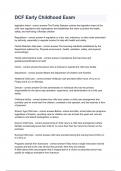Study guide
Pitt to Peel History Notes Mindmap Questions - Exam Revision
A Level Pitt to Peel History Mindmaps covering every possible exam topic and question. 26 SLIDES! Full of information to pass the exam and get amazing grades. Full in-depth notes and analysis. Everything you need to prepare for the exam including facts, figures and analysis (plus exam questions)....
[Show more]





